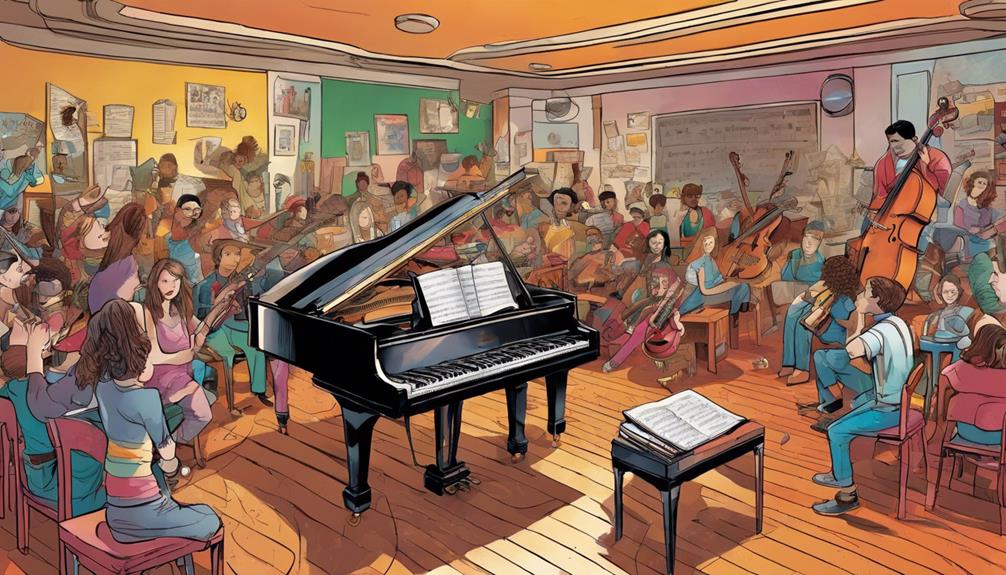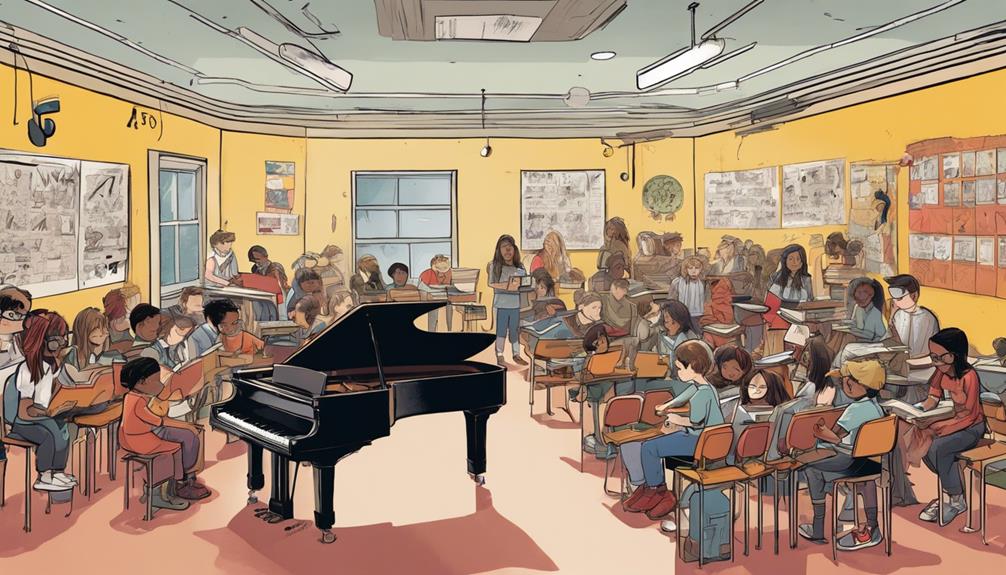To build a music school, you'll need to secure funding through grants, loans, and investors, and develop a thorough curriculum that caters to diverse skill levels and musical interests. Assemble a strong instructional team by recruiting instructors with diverse backgrounds and providing ongoing training. Create a solid business plan to attract investors and implement effective marketing strategies that showcase your school's strengths. Engage with your local community through outreach efforts, partnerships, and events. Foster a supportive learning environment that encourages collaboration and individual growth. Continuously evaluate and adapt your strategies to guarantee long-term success. By following these steps, you'll be well on your way to turning your dream into a thriving music school.
Key Takeaways
- Secure funding by researching grants, loans, investors, and personal savings, and create a detailed budget outlining expenses.
- Develop a comprehensive curriculum with clear educational objectives, diverse teaching methods, and continuous evaluation.
- Build a strong instructional team by recruiting diverse instructors, providing training opportunities, and evaluating performance.
- Effectively market and promote your school by defining a unique value proposition, leveraging industry insights, and showcasing strengths.
- Engage with the local community through outreach efforts, partnerships, and events to build a supportive learning environment.
Securing Funding and Resources
To turn your music school vision into a reality, you'll need to secure the necessary funding and resources, and that starts with identifying potential sources of financial support. Take the time to research and explore various options, including grants, loans, investors, and personal savings.
Grants specific to music education or small business development can provide valuable financial support, so be sure to apply for those that align with your school's mission and goals.
Create a detailed budget outlining expenses for equipment, staff salaries, marketing, and other operational costs to determine your resource needs. This will help you pinpoint exactly how much funding you require and where it will be allocated.
A solid business plan highlighting your financial requirements and projected returns will also attract investors or secure loans. Utilize online resources, financial institutions, and networking opportunities to explore funding options and secure the necessary resources for your music school.
Developing a Comprehensive Curriculum

As you begin developing a thorough curriculum for your music school, it's crucial to establish clear objectives that outline what you want your students to achieve.
You'll need to design lesson plans that align with these objectives, ensuring a structured approach to teaching and learning.
Set Clear Objectives
By establishing clear educational objectives for each program, you'll create a roadmap for your music school's curriculum, ensuring that every student receives a well-rounded and effective music education. This will help you stay focused on what you want your students to achieve, and guide your teaching methods and materials.
| Program | Objectives |
|---|---|
| Bachelor of Music | Develop technical proficiency, music theory knowledge, and performance skills |
| Certificate in Music Production | Learn industry-standard software, recording techniques, and mixing principles |
| Music Therapy | Understand the therapeutic effects of music, develop counseling skills, and learn to adapt music for diverse populations |
| Music Business | Gain knowledge of the music industry, including marketing, management, and copyright law |
| Jazz Performance | Master jazz improvisation, develop ear training, and learn jazz history and theory |
Design Lesson Plans
You'll need to develop lesson plans that cater to different skill levels, ages, and musical interests to create a well-rounded curriculum that supports your established educational objectives. This thorough approach will guarantee that students receive a thorough music education, regardless of their background or goals.
When designing your lesson plans, incorporate music theory, technique exercises, and repertoire selections to provide a solid foundation. Additionally, offer performance opportunities to help students build confidence and apply their skills in real-world scenarios. If you're teaching songwriting, for example, provide guidance on writing songs that showcase their creativity and musicianship.
To cater to diverse learning styles, utilize a range of teaching methods, including individual instruction, group classes, workshops, and online resources. Align your lesson plans with learning objectives, assessment criteria, and progression milestones to track student development and achievement.
Continuously evaluate and update your lesson plans based on student feedback, industry trends, and educational best practices to ensure relevance and effectiveness. By doing so, you'll create a dynamic and engaging curriculum that supports your students' growth and helps them achieve their musical aspirations.
Create Music Syllabus
Developing a thorough music syllabus outlines the framework for your music school's curriculum, guaranteeing a well-rounded music education that caters to diverse student needs and goals. As you create your syllabus, consider the unique needs of your students, including their age, skill level, and learning style. By tailoring your curriculum to these factors, you'll build confidence in your students as they progress through their music education.
Your syllabus should encompass a variety of music genres, theory, technique, and performance skills to provide a complete education. Continuously update and refine your curriculum based on student feedback, industry trends, and educational standards to ensure it remains relevant and effective. By doing so, you'll align your syllabus with the overall mission and goals of your music school, providing a well-rounded education that prepares students for success.
A well-structured syllabus will also help you develop lesson plans that are clear, concise, and achievable, ensuring that your students stay engaged and motivated throughout their music education. By following these guidelines, you'll create a music syllabus that provides a solid foundation for your music school's curriculum, setting your students up for success and helping them build confidence in their musical abilities.
Building a Strong Instructional Team
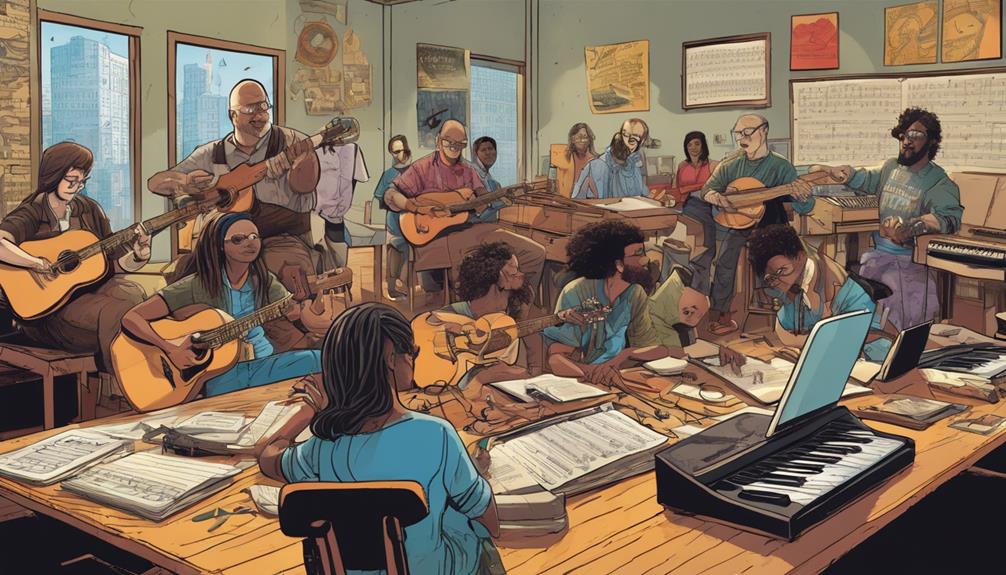
Crafting a dream team of instructors is vital to delivering exceptional music education, as they serve as role models, mentors, and guides for students on their musical journeys. As you build your music school, it's important to focus on assembling a strong instructional team that can cater to diverse student needs and provide high-quality teaching.
Here are some key strategies to help you achieve this:
- Recruit instructors with diverse musical backgrounds and teaching styles to cater to a wide range of student needs.
- Provide ongoing training and professional development opportunities to make sure instructors stay current with teaching methods and industry trends.
- Foster a collaborative environment among instructors to share best practices, resources, and support for continuous improvement.
- Implement a rigorous selection process for hiring instructors, including auditions, interviews, and reference checks, to maintain high teaching standards.
- Regularly assess instructor performance through student feedback, evaluations, and observations to identify areas for growth and enhancement.
Effective Marketing and Promotion

To make your music school stand out in a competitive market, define a unique value proposition that resonates with your target audience by leveraging industry experts' insights and experience. With 30 years of expertise in branding and artist development, Cari Cole's guidance can help you craft a message that truly connects with your audience.
Additionally, tap into the collective knowledge of the community on vocal coaching, music theory, and effective feedback to refine your marketing strategies. Don't invest too much money in promotional efforts without a clear understanding of what sets your school apart.
Instead, focus on creative marketing techniques that showcase your school's strengths. Analyze song structure and form to create engaging content that speaks to your target audience. Share transformation stories and challenges faced by artists to build a relatable brand.
Leverage studio recording insights on writing harmonies, hip hop songwriting, and music theory to create compelling marketing materials. By doing so, you'll attract students who appreciate your unique approach and are willing to invest in their musical growth.
Engaging With the Local Community
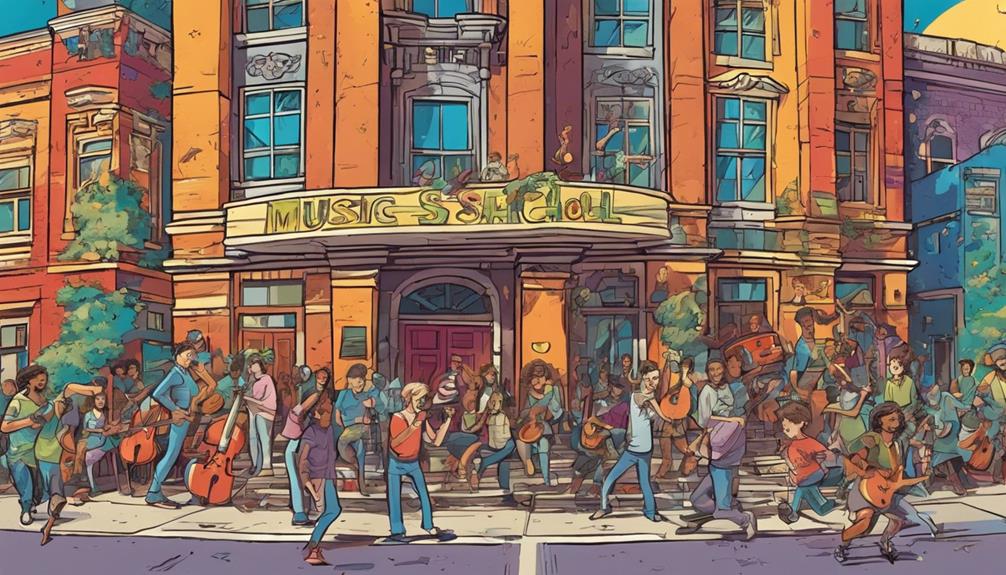
As you work to establish your music school, engaging with the local community is essential for building awareness and attracting students.
You'll want to focus on local outreach efforts, such as partnering with schools and community centers, to showcase your school's unique offerings.
Local Outreach Efforts
By engaging with local schools, community centers, and events, you can effectively promote your music school and attract potential students. This is a great way to showcase your music school's offerings and build relationships with the community.
Here are some local outreach efforts you can consider:
- Offer free workshops, performances, or demos to give the community a taste of what your music school has to offer.
- Collaborate with local businesses for cross-promotion and sponsorships to increase visibility.
- Participate in community events like fairs, festivals, and fundraisers to connect with potential students who are interested in playing music.
- Engage with local schools to offer music programs, workshops, or even teach music classes.
- Utilize social media platforms and local advertising to reach a wider audience in the community.
Build Partnerships Locally
By collaborating with local schools, community centers, and music stores, you can build partnerships that increase visibility and attract potential students to your music school. These partnerships can lead to a stronger presence in the community, making your music school the go-to destination for music education.
| Partner | Benefits |
|---|---|
| Local Schools | Offer workshops, performances, and events to engage with students and teachers |
| Community Centers | Host open houses, music camps, or community concerts to showcase your music school |
| Music Stores | Create referral programs to drive student enrollment and establish a strong network |
| Local Businesses | Provide scholarships or discounts to students from local schools to foster relationships |
| Music Organizations | Offer exclusive deals to members, increasing your music school's credibility |
Host Community Events
Hosting community events is an essential step in building a strong presence in your local community, allowing you to showcase your music school's unique offerings and establish a connection with potential students. By hosting events, you can create a buzz around your school, attract new students, and build relationships with local organizations and businesses.
Here are some ideas for community events you can host:
- Host regular open houses, recitals, and workshops to engage with the local community and showcase your music school.
- Collaborate with local schools, libraries, and community centers to promote your music school and attract new students.
- Offer free trial classes or workshops to encourage community members to experience the value of your music school.
- Organize charity events, fundraisers, or concerts to give back to the community and raise awareness about your music school.
- Partner with local businesses or organizations to co-host events and build relationships within the community.
Creating a Supportive Learning Environment
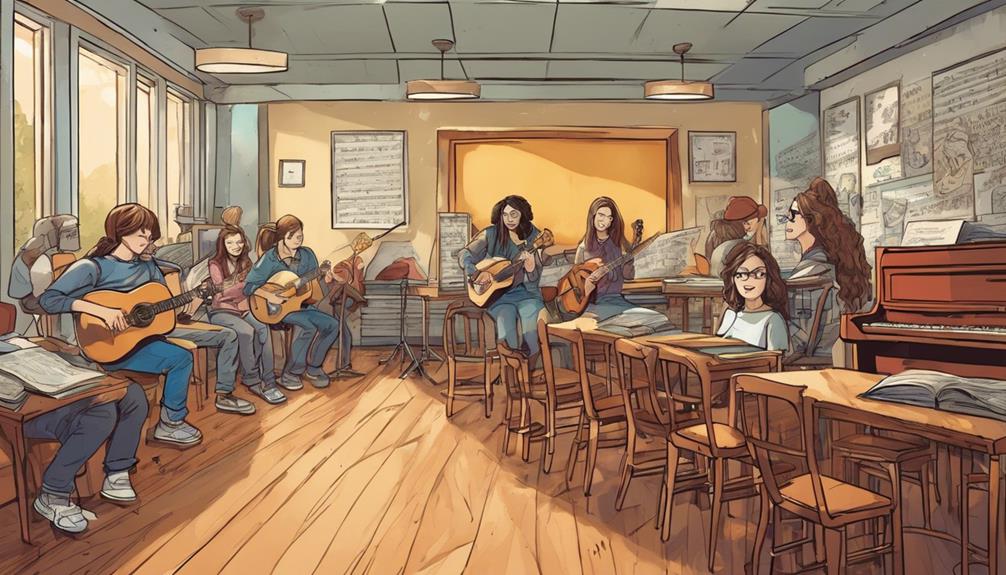
Creating a Supportive Learning Environment
You'll want to design the physical space of your music school to inspire creativity and collaboration among students, setting the tone for a supportive learning environment that fosters growth and exploration. This can be achieved by incorporating open spaces, comfortable seating areas, and state-of-the-art equipment. By doing so, you'll create an atmosphere that encourages students to share ideas, learn from each other, and develop a sense of community.
| Aspect | Description | Benefits |
|---|---|---|
| Student-Centered Approach | Focus on individual needs and interests | Personalized learning, increased engagement |
| Variety of Resources | Offer tools and materials to support learning | Enhanced creativity, improved skills |
| Mentorship Opportunities | Provide feedback, guidance, and support | Improved performance, increased confidence |
Continuously Evaluating and Adapting
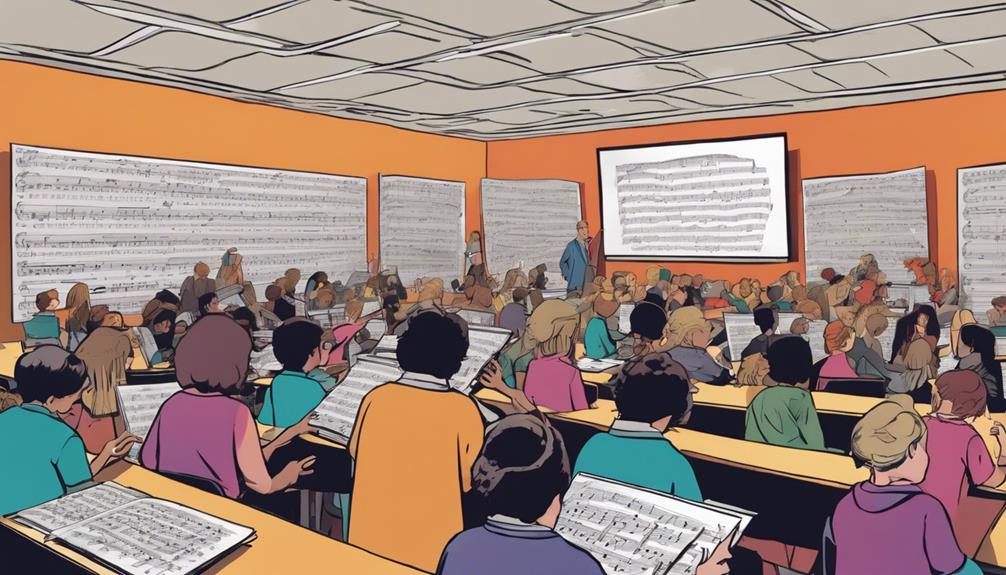
You'll need to regularly assess and adjust your music school's operations to guarantee long-term success and stay ahead of the competition. This involves continuously evaluating and adapting your business model, pricing strategies, and location to align with your financial goals.
To achieve this, focus on the following key areas:
- Evaluate student numbers, lesson prices, and necessary expenses to secure financial success and sustainability.
- Adapt training programs for instructors to optimize costs while maintaining high-quality music education.
- Monitor and project expenses and income through profit and loss projections for effective financial planning.
- Continuously review and refine your marketing message to resonate with your target audience and drive business growth.
- Regularly assess and adjust your music school's operations to secure long-term success and stay ahead of the competition.
Fostering a Thriving Music Community
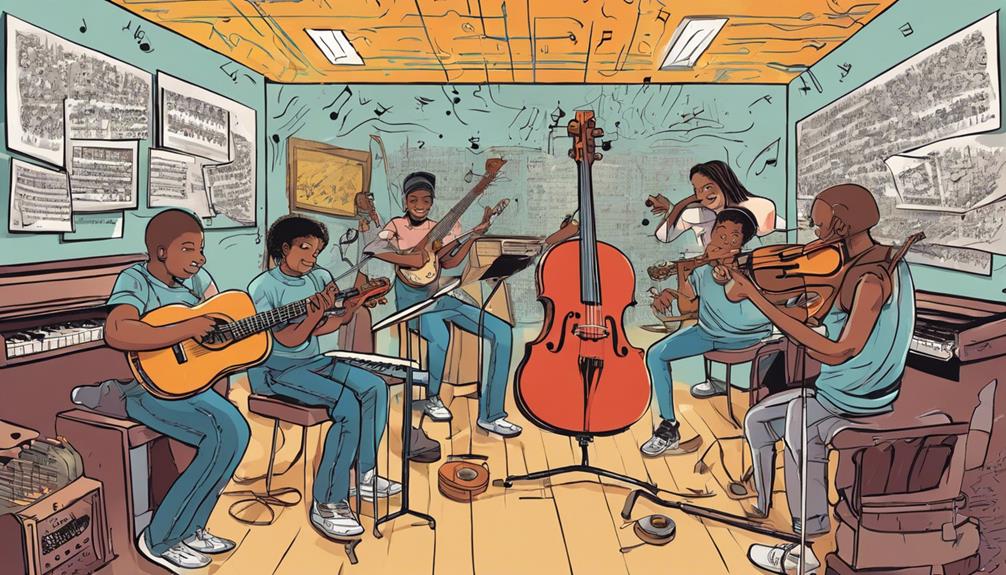
One key element in building a successful music school is fostering a thriving music community that resonates with students, parents, and instructors alike. This can be achieved by creating a welcoming environment that encourages collaboration and support among music enthusiasts.
Over a period of time, this sense of community will develop, leading to a strong bond among members. To enhance this experience, consider offering value-added experiences like group events, workshops, and performances. These events won't only strengthen community bonds but also provide opportunities for students to showcase their talents.
Additionally, soliciting feedback and input from the community will guarantee that your music school continuously improves and tailors its offerings to their needs. By establishing a culture of inclusivity, support, and belonging, you'll create an environment where students, parents, and instructors feel valued and motivated to contribute to the community's growth.
Frequently Asked Questions
How to Create a Music School?
To create a music school, you'll need to determine your unique selling proposition, develop a business plan, secure necessary permits, design a curriculum, and invest in quality equipment and facilities to attract and retain students.
How to Grow a Music School?
To grow your music school, focus on diversifying programs, effective marketing, and a welcoming environment. Gather feedback to improve and expand, attracting new students and fostering loyalty among existing ones.
Can Attending a Live Music Show Help in Building a Music School?
Attending a live music show can greatly benefit in building a music school. When people experience the live show, they develop a deeper appreciation for music and are more likely to support educational institutions that promote musical education. By connecting people to the music, it inspires them to invest in creating opportunities for future musicians.
Conclusion
You've turned your dream into a reality by building a music school that offers a well-rounded curriculum, a strong instructional team, and a supportive learning environment.
According to the National Association of Music Merchants, 85% of Americans believe that music education should be a part of school curriculum, highlighting the demand for music schools like yours.
By consistently assessing and adjusting, you'll guarantee that your school remains a thriving hub for music education and a valuable resource for your community.

